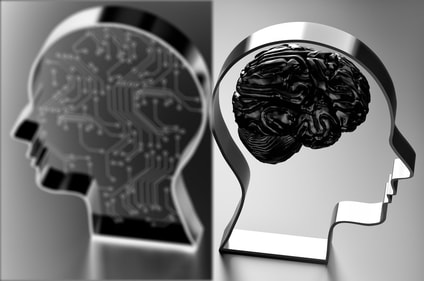 “A commenter who goes by ‘swordfish’ got human minds and thinking badly mixed up recently, claiming minds and computers are a lot alike. In a comment on last week’s atheist meme article, he wrote, 1) Computers can process anything which can be represented in a computer’s memory, which includes ideas. 2) The human brain could be said to be just processing electro-chemical reactions. Is he right? Now, as a Christian I’m committed to the belief that the physical world isn’t all there is. God is spirit, and He has made us in His image, so that there’s more to us than just the bodies we walk around in. But there are plenty of people who disagree. Like swordfish, they think all reality can be explained by matter, energy and the laws of nature by which they interact--just that, and nothing else. The problem is, if they’re right, they’re wrong. Or at least they have no reason to think they’re right. There are many ways to show that’s the case. One way is to run the comparison between human minds and computers, and see how it comes out. That’s how I answered swordfish. Consider the statement, ‘It’s raining outside, therefore the roads will be wet.’ Humans process that in terms of ideas. We start with what we know about ‘rain,’ ‘wet,’ and ‘road,’ and we run through the logic in our minds. We reach our conclusion based on what the words mean, and based on reasons that connect them to each other. But what does a computer do? In raw terms, computers process voltages, which are purely electrical things, their status controlled by natural law. Some of those voltages are associated with terms like ‘rain,’ ‘road,’ and ‘wet.’ That’s because hardware designers and programmers have designed computers so they can represent terms like that. But the computer doesn’t have any idea what those words mean. It has no clue what ‘wet’ is, or any of the rest. So there’s the first reason computers can’t process ideas like humans do: Computers don’t have ideas. They don’t know meanings of words. They can only have voltage states, designed by humans to represent words. The computer doesn’t think, ‘the road must be wet because that’s what happens when it rains.’ It arrives at its output due to physical laws, not because of logical reasons. If swordfish is right, and if minds operate like computers, then minds don’t operate according to reasons. And if minds don’t operate according to reasons, then even swordfish has no reason to think he’s got good reason to think what he thinks. Which is absurd. It’s impossible. When a conclusion is that absurd, you know there’s something wrong with the thinking that led to it.” “A Skeptic Gets It Wrong,” Tom Gilson, The Stream, Dec. 8, 2018 Comments are closed.
|
Archives
February 2020
|
Ads do not imply endorsement | Policy/Terms of Service | About Us | Contact Us | © Life Work Academy, Inc.
 RSS Feed
RSS Feed

